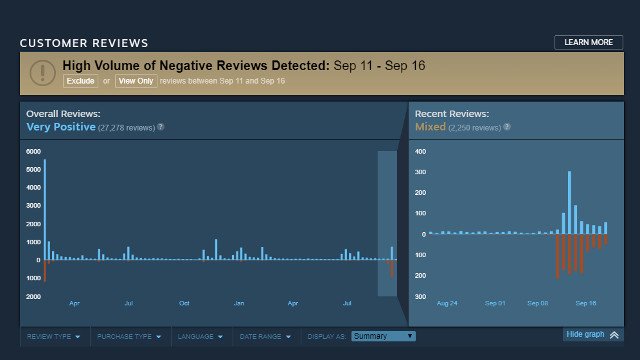Valve has outlined a plan to prevent “review bombing” on Steam following the Firewatch controversy, in which a number of Steam users posted negative reviews in protest of a YouTube DMCA claim made by the game’s developers.
Review bombing, as Valve describes it, “is where players post a large number of reviews in a very compressed time frame, aimed at lowering the Review Score of a game. At the same time, they upvote each other’s reviews and downvote all the other reviews.” After Firewatch developers Campo Santo posted a DMCA claim against Felix “PewDiePie” Kjellberg’s video of him playing the game, many took to the Steam user reviews in order to write multiple negative reviews, causing the game’s rating on the platform’s store to plummet.
Valve addressed this kind of behavior in a blog post, writing: “On the one hand, the players doing the bombing are fulfilling the goal of User Reviews – they’re voicing their opinion as to why other people shouldn’t buy the game. But one thing we’ve noticed is that the issue players are concerned about can often be outside the game itself.
“It might be that they’re unhappy with something the developer has said online, or about choices the developer has made in the Steam version of their game relative to other platforms, or simply that they don’t like the developer’s political convictions. Many of these out-of-game issues aren’t very relevant when it comes to the value of the game itself, but some of them are real reasons why a player may be unhappy with their purchase.”
Also: Toys R Us Goes Bankrupt: Here’s Why Video Games are to Blame
In order to prevent this from happening, or at least lessen its impact, Valve will now employ a histogram that will show the history of Steam user reviews to buyers, outlining when a game has received an influx of user ratings, be they negative or positive. The goal of this graph is to pinpoint when a game has received a sudden increase in reviews post-launch, with it being suggested that potential buyers would then do their own independent research to figure out why any temporary distortions may have taken place.
Here’s how Valve outlined Steam reviews would look like from here on out:

And here’s how the histogram looks on Firewatch‘s store page:

Discussing the histogram, Valve continued: “Starting today, each game page now contains a histogram of the positive to negative ratio of reviews over the entire lifetime of the game, and by clicking on any part of the histogram you’re able to read a sample of the reviews from that time period.
“As a potential purchaser, it’s easy to spot temporary distortions in the reviews, to investigate why that distortion occurred, and decide for yourself whether it’s something you care about. This approach has the advantage of never preventing anyone from submitting a review, but does require slightly more effort on the part of potential purchasers.”
Valve also noted that the histogram will also show “how a game’s reviews have evolved over time, which is great for games that are operating as services.”
It’s debatable whether or not the histogram will effectively curb review bombing, but at least it will give buyers some more data on the games they’re interested in before they make their purchase.







